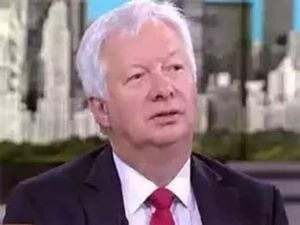FBI Director Christopher Wray's announcement to resign shortly before Donald Trump steps back onto the political stage has sent ripples through the American political system, raising eyebrows and questions about the future of the bureau. Wray, initially appointed by Trump to serve out a decade-long term, has chosen to depart from his position rather than face the prospect of being fired by the incoming president. This decision aligns with Trump's recently stated intentions of appointing Kash Patel, a staunch ally of his administration, as Wray's replacement, which many believe signals yet another shift within the already polarized FBI.
Wray's resignation is particularly notable coming on the heels of allegations against the FBI, with claims of politically motivated investigations and targeting of certain groups, including conservatives and Christians. Many feel his move is less about personal choice and more about the chilling environment created by partisan politics. Representative Gerry Connolly, among others, has criticized Wray for bowing to what appears to be political pressure, stating this resignation compromises the integrity of the FBI. Connolly remarked, “I think for the rank-and-file FBI, his decision to resign prematurely under pressure is tantamount to abandonment.”
Trump himself heralded Wray's resignation as “a great day for America,” claiming it opens the door for much-needed changes at the FBI. He accused Wray of overseeing the “weaponization” of the bureau against his administration and its allies, declaring, “Under the leadership of Christopher Wray, the FBI illegally raided my home” referring to the contentious events surrounding the Mar-a-Lago raid.
Wray's leadership has faced intense scrutiny since he took office. Under his direction, the FBI has been accused of harassing law-abiding citizens, especially concerning its treatment of whistleblowers within the agency. The FBI’s handling of evidence surrounding major political events, including the January 6 Capitol riots and the investigation of parents protesting at school board meetings, has exacerbated existing tensions between the bureau and the public.
While insiders speculate about Trump’s motives for replacing Wray with Patel, it’s widely understood the new leadership could allow for more aggressive posturing against perceived adversaries of the MAGA movement. According to experts, Wray’s preemptive resignation could open avenues for Trump to quickly install Patel or another loyalist without circumventing Senate approval, as his withdrawal simplifies the process under the Federal Vacancies Reform Act.
Mark Joseph Stern, legal analyst, reflected on the ramifications of Wray stepping down now versus if he forced Trump to fire him. “It sends a terrible message,” he noted, adding it gives Trump the upper hand in reshaping FBI leadership according to his priorities and aligns even closer with his loyalist principles.
Wray’s time as director has not been without distractions or controversies. There were accusations surrounding the FBI’s alleged surveillance of church congregations and pro-life advocates, leading many critics to argue the bureau has strayed from its original mission of upholding justice.
Looking at Wray’s tenure through the lens of his critics, his leadership was marred by claims of substantial failures within the agency. Sen. Chuck Grassley recently leveled serious accusations against Wray for purportedly neglecting cases involving President Biden and his family, prompting serious doubts about his capability of leading the FBI impartially.
Conversely, Wray always maintained he aimed to uphold the values and principles of the bureau, stating at numerous public forums, “My goal is to keep the focus on our mission—the indispensable work you’re doing on behalf of the American people every day.” This apparent dissonance between Wray’s stated objectives and the allegations against him has contributed to the critique of his leadership.
With Wray now resigning under such public scrutiny, questions loom over how the FBI will navigate the politically charged environment it finds itself steeped within. Trump’s promise of restoring what he calls the “Rule of Law for all Americans” reflects his ambitions to realign federal agencies to favor his base.
Meanwhile, Kash Patel, who has been nominated to replace Wray, faces skepticism from many who fear the potential consequences of appointing someone within the MAGA circle to such high office. Patel is known for his hardline views on what he considers political bias against Trump, with no shortage of strong opinions on how the FBI should operate moving forward. It seems clear the stakes are high as the FBI braces for what lies ahead when Trump regains control.
Indeed, Wray’s departure may mark more than the end of one director’s tenure; it signifies the potential redirection of the FBI amid rising partisan divisions, pushing the envelope on how federal law enforcement interacts with political factions and ordinary citizens.
The FBI's traditionally apolitical standing has been placed on shaky ground over the past few years, and Wray's resignation may act as both a capstone and catalyst for the bureau’s next chapter. The ramifications of this transition, especially coupled with Patel’s likely ascension, could usher the FBI toward unprecedented changes as it continues facing backlash and scrutiny from varied factions of American society.
When examining the broader picture, it’s evident the paths taken by Wray and Trump speak volumes about where America finds itself today—entrenched along political lines, with each shift of leadership deeply observed and debated by the public. Moving forward, ensuring the integrity and credibility of federal law enforcement will be more important than ever as it navigates these turbulent waters. The future remains uncertain, but one aspect is clear: the FBI must adapt to its latest political environment if it is to maintain confidence both within its ranks and from the public.



